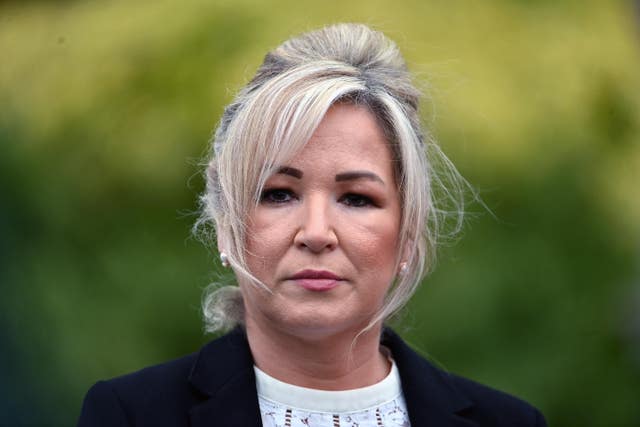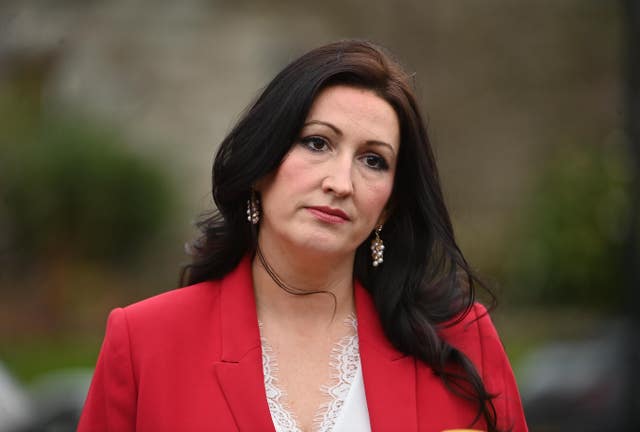
A Government offer to write off almost £600 million of Stormont debt is conditional on the powersharing executive raising £113 million of its own revenue.
The stipulation is a key element of a £3.3 billion financial package drawn up by the Treasury to support the return of devolution in Northern Ireland.
Chief Secretary to the Treasury Laura Trott confirmed details of the settlement in a letter to Stormont Finance Minister Caoimhe Archibald on Tuesday.
The Government described it as a “significant, fair and generous” package.
The letter comes after Stormont leaders voiced concern about introducing new revenue raising measures in the region.

First Minister Michelle O’Neill and deputy First Minister Emma Little-Pengelly have both highlighted the likely negative impact of new or hiked charges on hard-pressed families in the region.
However, Executive ministers did write to Prime Minister Rishi Sunak last week mentioning that Stormont officials would be drawing up a sustainability plan that would include a focus on potential revenue raising measures.
On Monday, Ms O’Neill definitively ruled out the introduction of water charges as a tool to raise extra cash.
The Government said the financial settlement included a requirement for the Executive to deliver a balanced budget for 2024/25 that includes a minimum of £113 million raised through locally generated income.
The £113 million equates to a 15% rise on the portion of household rates bills that is set by the executive.
Rates bills are calculated by adding the regional rate (set by the Executive) to the district rate (set by local councils) and multiplying that by individual property values.
While the Government believes a rate rise would be the simplest way to raise the £113 million – as the rates billing system is already established – it is not opposed to Executive ministers opting to generate the revenue by other means.
However, it has made clear that its offer to write off a £559 million debt accrued due to overspends of Stormont budgets during the two year Stormont impasse is conditional on ministers producing, by May this year, a sustainability plan that includes revenue raising measures and efficiency initiatives.
The broad shape of the financial package was already known after it was hammered out in negotiations between the local parties and the Government at Hillsborough Castle before Christmas when powersharing was still in cold storage.
The £113 million revenue raising ask was put to the parties during those negotiations.
Details on the financial package outlined in the letter to Ms Archibald include:
– Reform of the Barnett formula for allocating Treasury funds to Northern Ireland, with funding rates for the region set at 24% above comparative rates in England. The Government said this would reflect the “different levels of need in Northern Ireland”.
– A £1 billion fund to stabilise Stormont’s public finances.
– £34 million to tackle spiralling hospital waiting lists.
– The conditional write-off of a multimillion-pound overspend of Treasury funding during the powersharing impasse.
– £584 million to help meet public sector pay demands in the current financial year.
– Boosting the Executive’s spending powers to transform public services by repurposing in excess of £700 million of existing and new UK Government funds.
– Increase the Executive’s annual capital borrowing limit by 10% in 2024/25, a limit which will then increase annually in line with inflation.

The Government said it has also committed to open discussions with the Executive on a “new fiscal framework” for Northern Ireland.
Northern Ireland Secretary Chris Heaton-Harris welcomed confirmation of the settlement’s details.
“This package tackles the immediate budget pressures facing the restored Executive and allows it to take action to rapidly stabilise public services, while increasing opportunities for investment and improved infrastructure,” he said.
“It also paves the way for vital transformation of public services, and will deliver well-deserved pay awards for public sector workers.
“It is now for the Northern Ireland Executive to use this significant financial package to take forward the vital work of public service transformation and the commitment to deliver sustainable finances – ensuring better outcomes in the day-to-day lives of the people in Northern Ireland.”
Asked about localised revenue raising measures on Monday, Ms O’Neill insisted the onus should instead be on the Government to deliver a “proper funding model” for Northern Ireland.
She made clear the Executive would not be introducing water charges.
Water charging is not the only option open to ministers to raise extra cash for public services, but it is one of the more significant potential tools at their disposal.
Hiking rates is another key fiscal lever at ministers’ disposal.
They could also potentially look to cut universal concessions, such as free prescriptions or public transport passes for people aged 60 and above.
Ms O’Neill’s comments chimed with weekend remarks by DUP deputy First Minister Ms Little-Pengelly, who said it was unsustainable to ask people to pay more for “poor public services”.

Enjoy the convenience of having The Sunday Post delivered as a digital ePaper straight to your smartphone, tablet or computer.
Subscribe for only £5.49 a month and enjoy all the benefits of the printed paper as a digital replica.
Subscribe